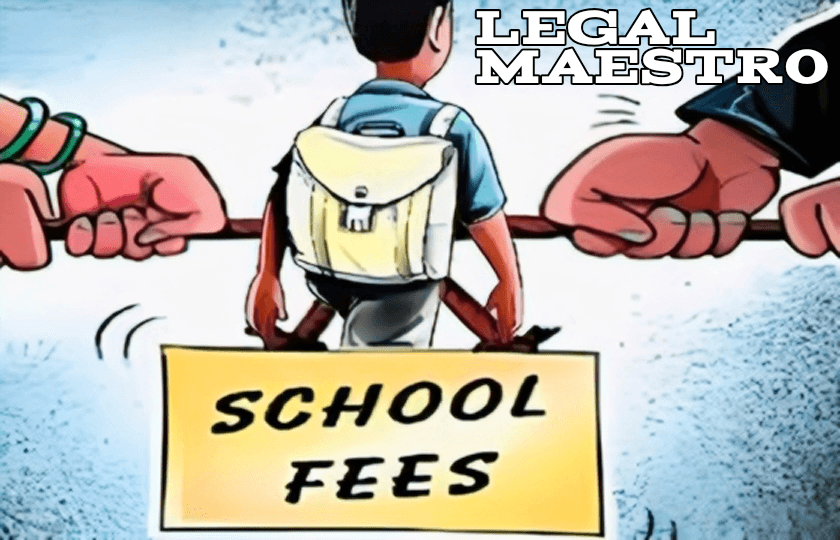
Education is the driving force behind both the advance of society and the achievement of personal goals. Article 21A of the Constitution of India recognizes education as a fundamental right, elevating it to the position of a fundamental opportunity.
However, the vision of sending their children to a private school continues to be out of reach for a significant number of families in Delhi. Due to recent tuition increases imposed by a number of prominent private schools, parents are finding it difficult to keep up with the ever-increasing expenditures.
One of the most serious questions that has arisen as a consequence of the protests, court battles, and policy debates that have followed is whether or not private schools are able to pursue their financial interests without compromising the constitutional guarantee of education.
For any queries or to publish an article or post or advertisement on our platform, do call at +91 6377460764 or email us at contact@legalmaestros.com.
The author of this paper goes into this complicated matter, exploring its constitutional origins, legal precedents, and policy responses under the administration that has recently taken office in Delhi.
For More Updates & Regular Notes Join Our Whats App Group (https://chat.whatsapp.com/DkucckgAEJbCtXwXr2yIt0) and Telegram Group ( https://t.me/legalmaestroeducators )
Right to Education and Article 21A of the Constitution
All children between the ages of six and fourteen are required to get an education that is both free and mandatory, as stipulated by Article 21A, which was included in the Constitution by the 86th Amendment in the year 2002.
For any queries or to publish an article or post or advertisement on our platform, do call at +91 6377460764 or email us at contact@legalmaestros.com.
By virtue of this clause, education was elevated from the status of a directive principle to that of a justiciable right.
Through the Right of Children to Free and Compulsory Education Act, which was passed by Parliament in 2009, Article 21A was given the opportunity to be implemented.
This law established standards for the infrastructure of schools, the credentials of teachers, and the ratios of students to teachers.
For any queries or to publish an article or post or advertisement on our platform, do call at +91 6377460764 or email us at contact@legalmaestros.com.
In addition, it mandated that all private schools that did not receive government funding set aside one-fourth of their seats for students who came from economically disadvantaged families. This was done to ensure that even private institutions made an effort to promote social inclusion.
The Developing Problem of Increasing Fees in Delhi
In spite of the safeguards provided by the RTE Act, private schools in Delhi have historically maintained a great deal of leeway regarding the composition of their tuition rates.
The rising costs of staff wages, infrastructure upgrades, and compliance fees were cited as the reason for the considerable fee hikes that were announced by a number of prestigious institutions over the course of the past year.
For any queries or to publish an article or post or advertisement on our platform, do call at +91 6377460764 or email us at contact@legalmaestros.com.
These increases reflected an unaffordable increase in household budgets for a significant number of families belonging to the middle class.
In other cases, students were threatened with suspension or expulsion for failing to make timely payments of their fees, which caused parental shock and fury.
The rising belief that unfettered fee hikes undermined the very promise of universal education under Article 21A was brought to light by public demonstrations held outside of school gates and petitions filed in the Delhi High Court.
For any queries or to publish an article or post or advertisement on our platform, do call at +91 6377460764 or email us at contact@legalmaestros.com.
The Legislative Actions Taken by the Government
The Delhi School Education (Transparency in Fixation and Regulation of Fees) Bill, 2025 was written by the Delhi government as a response to the increasing amount of pressure that was being shown.
The proposed legislation intends to restrict annual fee increases by mandating that educational institutions obtain prior approval from a Fee Regulatory Authority that is independent of the school.
A review of planned budgets, an audit of expenses, and a check to ensure that charge proposals are in line with realistic operational requirements would be carried out by the Authority.
For any queries or to publish an article or post or advertisement on our platform, do call at +91 6377460764 or email us at contact@legalmaestros.com.
In addition, the law proposes the establishment of school-level committees that would include members from parents, teachers, and administrative authorities in order to encourage transparency in the process of making budgetary decisions.
In the event that schools violate the regulations, they may be subject to penalties, and if they continue to fail to comply, their recognition may be subject to revocation.
The Influence of Judicial Interpretations on the Situation
The right to education is considered to be a fundamental component of the right to life, as stated in Article 21 of the Constitution of India, according to their consistent rulings.
For any queries or to publish an article or post or advertisement on our platform, do call at +91 6377460764 or email us at contact@legalmaestros.com.
Within the context of the historic Mohini Jain case, the Supreme Court ruled that the capitation fees that private universities imposed were in violation of both the right to education and the principle of equity.
An additional clarification was provided by the following Unni Krishnan judgement, which said that although the state has the authority to regulate private educational institutions, it cannot infringe upon their fundamental autonomy in terms of providing quality education.
These opinions state that fee systems must be reasonable and non-discriminatory in order to be considered acceptable. They also give the courts the authority to interfere in situations where financial activities violate constitutional principles or make it difficult for people to get an education.
For any queries or to publish an article or post or advertisement on our platform, do call at +91 6377460764 or email us at contact@legalmaestros.com.
School autonomy and social equity: a delicate balancing act
To ensure that excellent educational standards are maintained, private schools believe that they should have the ability to determine their own tuition rates.
Increasing compensation for qualified teachers, investments in technology, and improvements to facilities, according to their argument, require resources that are proportional to these changes.
The underlying goal of universal education, however, will be undermined if increases in tuition are greater than increases in family earnings.
For any queries or to publish an article or post or advertisement on our platform, do call at +91 6377460764 or email us at contact@legalmaestros.com.
While protecting the rights of students, a nuanced approach must take into account the necessity of schools to maintain their financial viability. In order to achieve this equilibrium, the Delhi bill proposes the establishment of a regulatory structure that is open and transparent.
Schools are encouraged to justify their expenditures, to include stakeholders in decision-making processes, and to achieve financial planning that does not exclude children who are deserving of financial assistance.
Directions to Take in Order to Achieve Educational Equity
Any regulatory law that is to be effectively implemented is contingent upon the capacity and responsibility of the institutions involved. When it comes to evaluating school budgets, the government of Delhi needs to make certain that the new Fee Regulatory Authority is able to act independently, with sufficient staffing and qualified personnel.
For any queries or to publish an article or post or advertisement on our platform, do call at +91 6377460764 or email us at contact@legalmaestros.com.
It is essential to have grievance redressal methods that are easily accessible, as well as regular audits and public reporting of fee decisions. It is of equal importance to educate parents about their rights and the procedures that can be used to contest unreasonable increases in tuition costs.
Through the monitoring of compliance, the performance of impact assessments, and the advocacy for policy revisions based on ground realities, organizations that are part of civil society have the potential to play a pivotal role.
The contradiction that exists between educational equity and institutional autonomy is brought into sharp relief by the issue that is provided by the increase in fees collected by private schools in Delhi.
For any queries or to publish an article or post or advertisement on our platform, do call at +91 6377460764 or email us at contact@legalmaestros.com.
However, the spirit of this right runs the risk of being watered down if families are unable to afford attendance at private schools, despite the fact that Article 21A requires the state to offer free and compulsory education.
The regulatory framework that has been proposed by the government of Delhi provides a mechanism to fulfill the constitutional pledge by ensuring that fee structures continue to be transparent, justified, and inclusive.
As we move forward, it will be vital to develop an educational environment in which every child is able to learn without being hindered by financial constraints. This will require a collective effort that includes schools, parents, government agencies, and the judicial system.
For any queries or to publish an article or post or advertisement on our platform, do call at +91 6377460764 or email us at contact@legalmaestros.com.


![JOB POST: Junior Associate at ASM Law Chambers, Jaipur [Freshers]](https://legalmaestros.com/wp-content/uploads/2025/11/Gemini_Generated_Image_8wrxer8wrxer8wrx-768x708.png)

